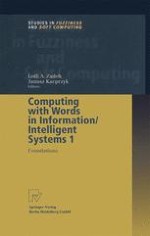
1999 | OriginalPaper | Chapter
Fuzzy Logic = Computing with Words
Author : Lotfi A. Zadeh
Published in: Computing with Words in Information/Intelligent Systems 1
Publisher: Physica-Verlag HD
Included in: Professional Book Archive
Activate our intelligent search to find suitable subject content or patents.
Select sections of text to find matching patents with Artificial Intelligence. powered by
Select sections of text to find additional relevant content using AI-assisted search. powered by
As its name suggests, computing with words, CW, is a methodology in which words are used in place of numbers for computing and reasoning. The point of this note is that fuzzy logic plays a pivotal role in CW and vice-versa. Thus, as an approximation, fuzzy logic may be equated to CW.There are two major imperatives for computing with words. First, computing with words is a necessity when the available information is too imprecise to justify the use of numbers. And second, when there is a tolerance for imprecision which can be exploited to achieve tractability, robustness, low solution cost and better rapport with reality. Exploitation of the tolerance for imprecision is an issue of central importance in CW.In CW, a words is viewed as a label of a granule, that is, a fuzzy set of points drawn together by similarity, with the fuzzy set playing the role of a fuzzy constraint on a variable. The premises are assumed to be expressed as propositions in a natural language. For purposes of computation, the propositions are expressed as canonical forms which serve to place in evidence the fuzzy constraints that are implicit in the premises. Then, the rules of inference in fuzzy logic are employed to propagate the constraints from premises to conclusions.At this juncture, the techniques of computing with words underlie -- in one way or another -- almost all applications of fuzzy logic. In coming years, computing with words is likely to evolve into a basic methodology in its own right with wide-ranging ramifications on both basic and applied levels.